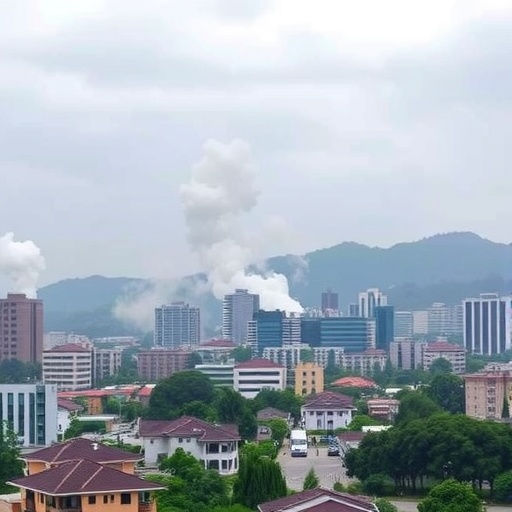In recent years, Nigeria has garnered international attention due to its rapidly advancing urbanization and the resultant challenges posed by air pollution. Despite being one of the most populous countries in Africa, Nigeria has encountered significant data gaps concerning air quality metrics. An alarming percentage of the population is exposed to hazardous air pollutants, which have now emerged as a leading cause of respiratory and cardiovascular ailments. This ongoing issue calls for urgent intervention and comprehensive analysis to bridge these data gaps.
A pivotal study conducted by F.S. Olise sheds light on the present state of air pollution across Nigeria and the alarming scarcity of reliable data regarding its prevalence, sources, and the ensuing health implications. The findings underscore that existing frameworks for monitoring air quality are inadequate and often hinder developments in public health policy and urban planning. With only a few monitoring stations equipped throughout the nation, the data landscape remains patchy, making it difficult to fully understand the nuanced implications of air pollution on society.
Moreover, the infrastructural challenges that plague Nigeria amplify the predicament surrounding air quality management. Basic necessities such as stable power supply, adequate road networks, and skilled personnel who can effectively operate and maintain air quality monitoring equipment are sorely lacking. This infrastructure gap not only complicates existing monitoring efforts but also exacerbates public health challenges associated with air pollution. As many developing nations face similar hurdles, Olise’s research serves as both a local and global call to action, illustrating the interconnectedness of environmental health and quality of life.
Public health implications stemming from poor air quality cannot be overstated. Nigeria is already grappling with a public health crisis, where diseases like asthma, chronic obstructive pulmonary disease, and cardiovascular illnesses are exacerbated by environmental stressors. Poor air quality disproportionately affects vulnerable populations, including the elderly, children, and those with pre-existing health conditions. Olise’s study highlights that failure to address these air pollution issues will lead to increased health care costs and loss of productivity, sparking a vicious cycle that could further impoverish the nation.
Additionally, non-governmental organizations and various stakeholders have emphasized the necessity for comprehensive air quality data collection to guide future environmental policies. Olise’s research identifies the gaps in existing frameworks and advocates for cooperation between government entities and civil organizations to facilitate a more integrated approach toward air pollution management. Enhanced collaboration will ensure that accurate data is harvested and made publicly available to inform citizens and policymakers alike.
Another critical aspect of the research is the expressed need for technology and innovation aimed at improving air quality monitoring. The integration of remote sensing technologies, mobile applications, and citizen science initiatives could augment existing monitoring networks and empower communities by providing real-time data on air quality metrics. Developing localized solutions tailored to meet community-specific challenges will be key in addressing air pollution issues effectively.
With respect to policy implementation, the study recommends adopting best practices from countries with robust air quality management systems. Countries that successfully curbed air pollution levels often invested in strong regulatory frameworks, public awareness campaigns, and sustainable urban planning strategies. Lessons from these nations could serve as valuable templates for Nigeria as it seeks to devise and enforce policies aimed at protecting public health while promoting environmental sustainability.
Moreover, in the context of Nigeria’s demographic dividends, capturing comprehensive data on air quality could elevate the nation’s standing on the global environmental stage. Drawing attention to Nigeria’s unique challenges while showcasing successful initiatives could facilitate international partnerships and attract funding opportunities. Olise’s findings align with a broader discourse highlighting the importance of sustainable development strategies in combatting climate change and environmental degradation.
Failure to act now will lead to dire consequences. Data-driven solutions must be prioritized to create effective public health campaigns targeting air pollution, with specific emphasis placed on the most affected demographics. Schools, hospitals, and community organizations should work together to identify and mitigate pollution sources, ensuring long-lasting impacts on public health for generations to come.
The urgency spoken of in Olise’s study echoes both through urban streets filled with vehicular emissions and rural areas plagued by biomass burning for cooking. Each breath taken by Nigerians carries the burden of air quality, urging an immediate response from every angle, including scientific inquiry, public policy, and community action. Ultimately, bridging the data gaps highlighted by Olise will serve not only to protect citizens from the invisible enemy of air pollution but also to bolster the nation’s socio-economic health.
The study concludes that unless systematic changes are made and a commitment towards comprehensive air quality monitoring is established, the progress towards cleaner air in Nigeria will remain painfully sluggish. For public health advocates, scientists, and policymakers, the clarion call has been made: No longer can air quality be viewed as a peripheral issue, but rather as central to the well-being of Nigeria’s populace and future development.
In summary, Nigeria’s air pollution crisis represents a multifaceted challenge that necessitates immediate attention and actions grounded in solid data. The work of researchers like Olise plays a pivotal role in framing the discourse surrounding air pollution, pointing to the pressing need for a unified response that transcends sectors and stakeholders. Only through collaborative efforts and strategic investments in monitoring technologies can Nigeria aspire to fight back against the toxic cloud of pollutants that loom over its cities, ensuring a healthier tomorrow for its citizens.
Subject of Research: Air Pollution in Nigeria
Article Title: Bridging data gaps in Nigerian air pollution: coverage, infrastructural challenges, and public health implications
Article References: Olise, F.S. Bridging data gaps in Nigerian air pollution: coverage, infrastructural challenges, and public health implications. Environ Sci Pollut Res (2025). https://doi.org/10.1007/s11356-025-36949-5
Image Credits: AI Generated
DOI:
Keywords: Air Quality, Public Health, Nigeria, Pollution Management, Data Gaps




